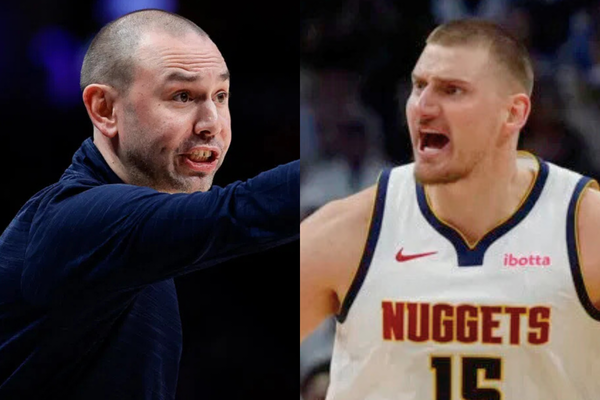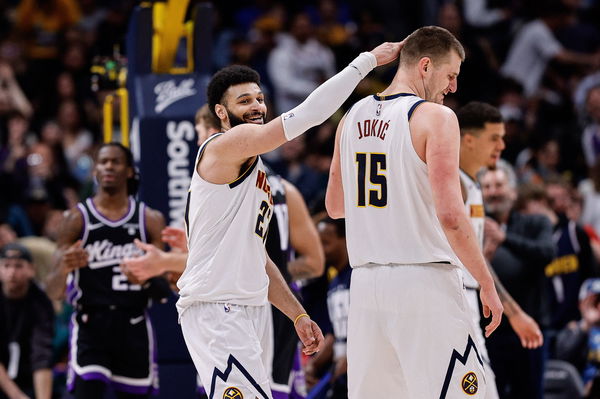
Imago
Image Source: Imagn

Imago
Image Source: Imagn
Nikola Jokic fouling out in the third quarter of a blowout playoff game wasn’t just unusual. It was symbolic. The Nuggets didn’t just lose Game 2 against the Oklahoma City Thunder—they got dismantled. A 149-106 rout that saw ‘The Joker’ exit early and a rotation unravel in real time. But beneath the scoreline and lopsided stats, another narrative simmered: Jokic’s growing tension with NBA officiating.
Watch What’s Trending Now!
After the game, interim coach David Adelman didn’t mince words. “They put smalls on him. Those smalls were allowed to do whatever they want,” he said. “So I’m really excited for Saturday [Game 3] that we’re gonna be able to do the same thing with their best players.” Adelman’s frustration wasn’t performative.
It was rooted in numbers. Consider this: in the regular season, Jokic averaged 6.4 free-throw attempts per game. That number plummets in this series, highlighting the change in officiating philosophy.
“We got punked,” Adelman admitted. “They came out with the right intensity, and we didn’t. You can’t join the party late in a playoff game. The whistle doesn’t go your way if you’re reactionary.” The issue here isn’t just fouls—it’s perception. And perhaps exactly why the Thunder’s approach was effective.
Jaylin Williams, a third-string center, frustrated Jokic from the moment he checked in. It wasn’t just physicality—it was the psychological disruption. Williams, known for his high basketball IQ and defensive positioning, used a variety of tactics. He fronted Jokic in the post, denying him easy entry passes. He used quick hands to disrupt Jokic’s attempts to establish deep position. And he subtly used his body to impede Jokic’s movement, often drawing charges or forcing him into difficult shots. Jokic, visibly annoyed, began forcing passes and rushing his post moves, leading to uncharacteristic turnovers. His sixth foul, a moving screen, was a direct result of this mounting frustration.
Adelman made clear: this wasn’t about sending a message to the refs or throwing in the towel. He kept the starters in because he wanted them to “feel the rhythm of physicality.” This is a calculated, if risky, strategy. Adelman wanted his team to understand the level of physicality that was being allowed, hoping they would adapt and respond in kind. It’s a strategy that has had mixed results in the past; while it can sometimes galvanize a team, it can also lead to further frustration and foul trouble.
However, that’s a strategic philosophy the Nuggets must lean into. If Game 2 was about Oklahoma City throwing the first punch, then Game 3 has to be about Denver throwing back. With force. And perhaps, with fewer illusions that composure alone earns you fairness in the postseason.
Why Jokic’s Stoicism Might Be His Biggest Weakness Right Now
In a league where drama often draws whistles, Nikola Jokic plays like a ghost. Often praised for his poise, the Serbian big man can appear too composed in the eyes of refs. He rarely flops, doesn’t lobby constantly, and maintains a stoic demeanor even when he’s clearly hammered on drives. Ironically, his maturity may be costing him whistles. While a player like Luka Doncic will contort his body and loudly protest even marginal contact, Jokic often simply turns and runs back on defense, absorbing the hit. This contrast in demeanor can influence how officials perceive and react to contact.
Joel Embiid, too, for better or worse, lobbies hard. Sell contact. Shift referee psychology with every grimace and flail. Draymond Green doesn’t just play the game—he narrates it to the officials in real time. And while these stars walk a line between passion and manipulation, they often control the emotional tempo of a game. Jokic?
He shrugs. And referees seem to shrug right back.
His foul-out in Game 2 wasn’t a technical unraveling. It was a slow bleed—small hits absorbed, bumps ignored, until one too many misreads ended his night early. Even the bench moment afterward—slumped in silence, towel draped, eyes empty—spoke volumes. It wasn’t just disappointment. It was disconnection. The Thunder took full advantage. In fact, SGA said, “We came out desperate. We wanted to just take care and control the things that we knew we could. And we did a pretty good job of that.”
Coach Mark Daigneault, for his part, masterfully rotated Williams and small-ball lineups to constantly harass Jokic without triggering whistles. And when Jokic did post up, the weak side swarmed him before Denver’s shooters could react. The broader concern?
Denver’s system has no margin for error without that Murray–Jokic two-man dance humming. In Game 2, that partnership never clicked. Murray finished with more turnovers than assists, and when Jokic tried to find rhythm with Jamal in pick-and-rolls, OKC’s backcourt flooded the lanes.

USA Today via Reuters
Feb 28, 2024; Denver, Colorado, USA; Denver Nuggets guard Jamal Murray (27) reacts with center Nikola Jokic (15) in the third quarter against the Sacramento Kings at Ball Arena. Mandatory Credit: Isaiah J. Downing-USA TODAY Sports
Meanwhile, Denver’s rotation depth continues to fray. The bench contributed little outside of Russell Westbrook, who looked like the only player determined to remind OKC who he once was. Westbrook’s 19 points and sheer energy gave the Nuggets brief sparks, but it wasn’t sustainable. Can Adelman trust him with more ball-handling duties in Game 3? Maybe. Because if Jokic is going to keep getting bruised in silence, someone else has to be the loud one.
And finally, let’s not ignore the psychological undercurrent. This is not the first time Nikola Jokic has been left looking isolated in big playoff moments. Think back to Phoenix in 2021 when he was ejected after a swipe at Cameron Payne. Or the weariness on his face after the Miami Finals grind. Jokic carries a team and a temperament. But sometimes, both need a break.
In Game 3, the Nuggets don’t just need better adjustments. They need a louder Jokic—or at least a team willing to fight on his behalf.

